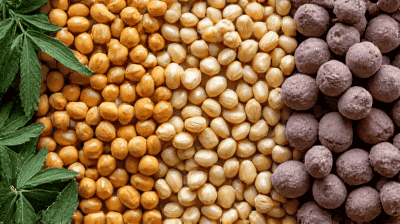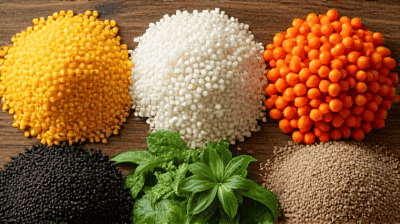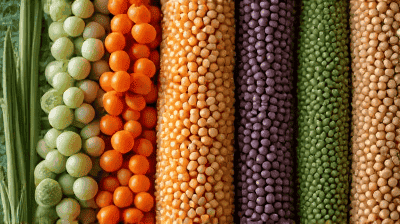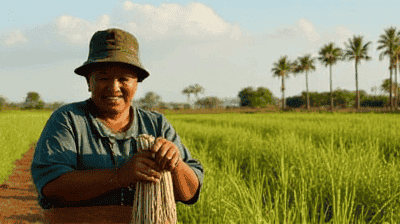
As climate change continues to impact agricultural systems worldwide, the need for resilience in food production becomes increasingly critical. One of the most effective strategies for enhancing resilience is ensuring seed sovereignty and protecting crop diversity. Seed sovereignty refers to the right of farmers and communities to save, use, and exchange seeds. In an era of global food insecurity and climate unpredictability, preserving crop diversity is essential for adapting to changing environmental conditions, ensuring food security, and promoting sustainable agricultural practices.
Seed sovereignty embodies the belief that communities, particularly those engaged in farming, should maintain control over their seeds. This concept emphasizes the importance of local knowledge, practices, and biodiversity. Seed sovereignty encompasses several key principles:
Cultural Heritage: Seeds are not just biological entities; they are integral to cultural identity, traditions, and agricultural practices. Protecting indigenous and heirloom varieties helps sustain cultural heritage.
Resilience: Diverse seed systems enable farmers to adapt to local environmental conditions and climate variability. By cultivating a variety of crops, farmers can mitigate risks associated with pests, diseases, and shifting climate patterns.
Food Security: Communities that retain control over seed diversity are better positioned to produce food tailored to local needs. This promotes self-reliance and reduces dependency on commercial seed suppliers.
Seed sovereignty plays a vital role in fostering sustainable agriculture and enhancing resilience to climate change. Some of the primary reasons why seed sovereignty is essential include:
Biodiversity Conservation: Protecting diverse seeds contributes to the conservation of genetic resources, which are crucial for breeding new varieties that can withstand climate challenges.
Local Adaptation: Local seed varieties are often better adapted to specific environmental conditions and are more resilient to local pests and diseases, making them essential for sustainable farming.
Empowerment of Farmers: Seed sovereignty empowers farmers by giving them the knowledge and resources to save and exchange seeds, fostering autonomy and reducing reliance on external inputs.
Sustainable Practices: Promoting seed sovereignty encourages agroecological practices, which prioritize biodiversity, soil health, and ecosystem functioning.

Crop diversity refers to the variety of crops grown within a specific area or agricultural system. It includes different species, varieties, and genetic traits. Crop diversity offers numerous benefits for climate adaptation:
Increased Resilience: Diverse cropping systems are inherently more resilient to climate fluctuations. By growing a mix of crops, farmers can buffer against crop failures due to droughts, floods, or pest outbreaks.
Improved Soil Health: Crop diversity enhances soil health by promoting biological activity, improving nutrient cycling, and reducing soil erosion. Healthy soils contribute to better water retention and crop productivity.
Pollinator Support: Diverse cropping systems provide habitats for pollinators and beneficial insects, which are essential for maintaining ecosystems and improving yields.
Nutritional Diversity: Growing a range of crops contributes to dietary diversity, ensuring that communities have access to a variety of nutrients and food sources.
Climate-Smart Agriculture: Crop diversity aligns with principles of climate-smart agriculture, which aims to increase productivity while reducing greenhouse gas emissions and enhancing resilience to climate change.
Throughout history, farmers have cultivated a wide variety of crops to meet local needs, adapt to changing environments, and ensure food security. Traditional agricultural systems often prioritized diversity, drawing on a wealth of genetic resources to create resilient farming systems. However, the Green Revolution of the mid-20th century shifted focus towards high-yielding monocultures, leading to a dramatic reduction in crop diversity. This shift has had several consequences:
Genetic Erosion: The focus on a few high-yielding varieties has led to the loss of thousands of traditional varieties, reducing genetic diversity and eroding resilience.
Dependency on Commercial Seeds: Farmers have increasingly relied on commercial seed suppliers for hybrid varieties that require chemical inputs, further entrenching industrial agriculture's dominance.
Vulnerability to Climate Change: The reduced diversity in cropping systems has left global agriculture more vulnerable to climate change, as monocultures are less capable of adapting to new conditions.
The rise of industrial agriculture has had significant implications for seed sovereignty and crop diversity. Key factors include:
Corporate Control: A handful of multinational corporations dominate the seed market, producing hybrids that often cannot be saved or replanted. This concentration of control undermines farmers' rights and reduces the availability of diverse seeds.
Standardization of Crops: The emphasis on uniformity in industrial agriculture has marginalized traditional and heirloom varieties, leading to a loss of genetic diversity and local adaptability.
Input Dependency: The reliance on synthetic fertilizers and pesticides associated with industrial agriculture can lead to soil degradation and increased vulnerability to pests and diseases.
Climate change poses a significant threat to global food systems, impacting crop yields, water availability, and pest dynamics. The impact of climate change on seed sovereignty and crop diversity includes:
Changing Growing Conditions: Altered temperature and precipitation patterns can render traditional varieties less effective, leading to the need for new, adapted varieties that can withstand changing conditions.
Increased Pest and Disease Pressure: Climate change can intensify the prevalence of pests and diseases, which can disproportionately affect monocultures and reduce yields.
Loss of Traditional Knowledge: As farmers face shifting conditions, the knowledge surrounding traditional seeds and cultivation practices may deteriorate, further weakening seed sovereignty.
The globalization of agriculture has created challenges for seed sovereignty. Some of the key issues include:
Seed Patents: Intellectual property laws allow corporations to patent seed varieties, restricting farmers' rights to save and share seeds. This leads to increased dependency on commercial seed suppliers and diminishes farmers' autonomy.
Loss of Traditional Varieties: Global trade can result in the displacement of local varieties by commercial hybrids, and the standardization of crops leads to a loss of local agricultural diversity.
Market Forces: The influence of global markets can drive farmers towards monocultures of cash crops, undermining the cultivation of diverse food crops essential for local food security.

To protect seed sovereignty, advocacy efforts are crucial in raising awareness of the importance of crop diversity and the need for policy change. Strategies include:
Empowering Farmers: Supporting farmers in their right to save, share, and exchange seeds can help bolster local seed systems and promote the cultivation of diverse crops.
Strengthening Local Seed Banks: Establishing and maintaining seed banks can preserve local genetic resources, ensuring access to traditional and heirloom varieties.
Promoting Agroecological Practices: Encouraging agroecology can foster diversity in agricultural systems while minimizing reliance on external inputs and promoting resilience.
To support seed sovereignty and protect crop diversity, policy changes at the local, national, and international levels are essential. Key policy recommendations include:
Reforming Seed Laws: Revising legislation that prevents farmers from saving and exchanging seeds can empower local farmers and communities.
Supporting Biodiversity Conservation: Implementing policies that incentivize the conservation of traditional varieties and promote funding for conservation initiatives is crucial for maintaining crop diversity.
Integrating Indigenous Knowledge: Collaborating with indigenous communities to incorporate traditional knowledge and practices into agricultural policy can enhance the preservation of crop diversity.
Community involvement and education are essential for protecting seed sovereignty and promoting crop diversity. Effective strategies may include:
Workshops and Training: Offering workshops on seed saving, cultivation practices, and agroecological farming can help farmers retain and utilize diverse crop varieties.
Building Networks: Establishing networks of farmers, seed savers, and researchers can facilitate knowledge exchange and the sharing of best practices for crop diversity.
Raising Awareness: Public education campaigns can inform consumers about the value of crop diversity and the importance of supporting local farmers and seed systems.
Several grassroots initiatives worldwide have successfully promoted seed sovereignty and crop diversity. These projects demonstrate the potential for resilience and self-reliance in local food systems:
Seed Sovereignty Movement in India: Organizations like Navdanya have championed seed sovereignty by promoting indigenous seeds, advocating for farmer rights, and establishing seed banks to preserve traditional varieties.
Community Seed Banks in Africa: Community seed banks across Africa empower farmers to save and store local seeds, ensuring access to diverse varieties that are well adapted to local conditions.
Heirloom Seed Exchanges: Seed exchange networks allow gardeners and farmers to share heirloom varieties, fostering a culture of collaboration and preserving genetic diversity.
Many farmers have adopted agroecological practices that prioritize crop diversity and seed sovereignty over industrial methods. Successful examples include:
Diversified Crop Rotations: Farmers practicing crop rotation and polyculture benefit from improved soil health and reduced pest pressure, leading to greater resilience against climate impacts.
Intercropping Systems: Intercropping, where multiple crops are grown in proximity, promotes biodiversity and increases resource efficiency, contributing to sustainable food systems.
Organic Farming Practices: Organic farmers routinely emphasize crop diversity and sustainable practices that align with seed sovereignty, reducing reliance on synthetic inputs and promoting ecosystem health.

Advancements in crop breeding can help enhance crop diversity and adaptability to climate change. Innovations may include:
Participatory Breeding: Engaging farmers in the selection and breeding process can lead to varieties that are better adapted to local conditions and resistant to pests and diseases.
Genetic Research: Harnessing modern genetic research techniques, including marker-assisted selection, can help identify traits that confer resilience while preserving genetic diversity.
Climate-Resilient Varieties: Breeders are working to develop new crop varieties that can withstand climate-related stressors, such as drought, flooding, and heat.
Global initiatives that promote seed sovereignty and crop diversity are essential for building resilience in food systems. Collaborative efforts may include:
International Agreements: Strengthening global agreements focused on biodiversity conservation, such as the Convention on Biological Diversity, can provide a framework for enhancing seed sovereignty.
Knowledge Sharing: International networks can facilitate the sharing of best practices and research findings related to seed sovereignty and crop diversity.
Support for Local Farmers: Encouraging global organizations to support local farmers and seed initiatives can enhance food security and promote sustainable agricultural practices worldwide.
Seed sovereignty and crop diversity are fundamental to building resilient agricultural systems that can withstand the challenges posed by climate change and food insecurity. By prioritizing the rights of farmers to save and exchange seeds, we can foster biodiversity, empower local communities, and enhance food security. Protecting crop diversity is not only essential for adapting to changing conditions but also for preserving cultural heritage and sustaining ecosystems.
As we move forward, it is crucial to support initiatives that promote seed sovereignty, embrace innovative practices, and encourage collaboration among farmers, researchers, and policymakers. Through collective action and sustained commitment, we can create a sustainable and equitable future for food systems, ensuring that they can weather the challenges of tomorrow while nourishing people and the planet.